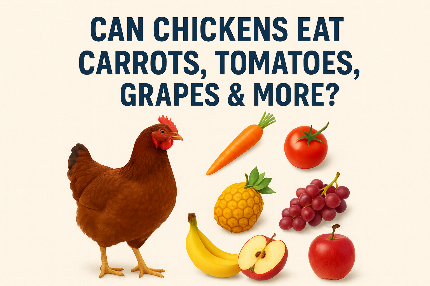Can Chickens Eat Carrots, Tomatoes, Grapes & More?

Can Chickens Eat Carrots, Strawberries, Tomatoes, and Other Common Foods?
Backyard chicken keeping has surged in popularity worldwide, and with it comes one of the most common questions: what can chickens safely eat? While commercial layer feed should always remain the backbone of a balanced diet, offering fresh fruits and vegetables is an excellent way to enrich their nutrition and keep them engaged.
Having raised flocks for more than a decade, I’ve learned that while chickens are surprisingly adventurous eaters, not every human food is safe. Below, I’ll walk you through each of the most commonly asked foods, based on first-hand experience, veterinary insights, and agricultural extension recommendations—so you’ll know exactly what to put in (and keep out of) your coop.
Can Chickens Eat Carrots?
Yes—carrots are perfectly safe for chickens. They are rich in beta-carotene, which supports healthy yolk color and immune function. Chickens often prefer cooked or grated carrots since raw whole ones can be too hard to peck at. I’ve personally found that leftover carrot peelings mixed with kitchen scraps make a great treat during winter when greens are scarce.
Can Chickens Eat Strawberries?
Absolutely. Strawberries are safe and loved by chickens, though they should be given in moderation due to their sugar content. The antioxidants and vitamin C are beneficial, but too many can lead to loose droppings. In my flock, I use strawberries as a “training treat”—they’ll follow me anywhere when I have them in hand.
Can Chickens Eat Tomatoes?
Yes—with caution. Ripe red tomatoes are fine for chickens, but unripe green tomatoes, leaves, and stems contain solanine, a toxin. Never toss them vine trimmings. Always serve only the ripe fruit. This distinction is critical, and I’ve seen keepers unknowingly cause digestive distress by ignoring it.
Can Chickens Eat Grapes?
Yes. Grapes are a safe and hydrating snack for chickens. Just slice them in half for smaller birds to avoid choking risks. My hens go wild for them in hot weather because they provide both sugar and water content.
Can Chickens Eat Bananas?
Yes. Bananas are safe and nutritious in small amounts. They’re high in potassium and magnesium, but because of their stickiness, they can make a mess in the coop. I recommend offering banana chunks on a dish rather than tossing them in the bedding.
Can Chickens Eat Pineapple?
Yes, but sparingly. Pineapple is safe but acidic, so it should only be an occasional treat. Too much can upset digestion. Chickens generally enjoy the flesh, but avoid giving them the tough core or spiky skin.
Can Chickens Eat Apples?
Yes—with a caveat. Apples are safe if you remove the seeds, which contain cyanide compounds in small amounts. The flesh and peel are healthy, offering fiber and vitamins. My flocks love apple quarters tossed into the run during fall harvest season.
Can Chickens Eat Onions?
No. Onions are not safe for chickens. They contain thiosulfate, which can cause hemolytic anemia. Even small amounts over time may damage their red blood cells. Always keep onions (raw, cooked, or dried) out of their diet.
Can Chickens Eat Potatoes?
It depends. Cooked potatoes are safe, but raw green potatoes and skins contain solanine, making them toxic. Never feed sprouted or green-tinged potatoes. Boiled plain potato flesh can be a filling winter snack.
Can Chickens Eat Blueberries?
Yes. Blueberries are a superfood for chickens—loaded with antioxidants and vitamins. They may stain beaks and droppings, but that’s harmless. I’ve found them to be one of the healthiest summer treats.
Can Chickens Eat Bread?
Yes—but with limitations. Bread is safe in moderation, but it lacks the protein and nutrients chickens need. Too much can cause obesity and crop issues. Use it as an occasional leftover treat, not a staple.
Can Chickens Eat Broccoli?
Yes. Broccoli is safe and nutrient-rich. Both raw and cooked florets are fine, though steaming enhances digestibility. My hens love pecking at broccoli stalks hung in the run like a “treat toy.”
Can Chickens Eat Mushrooms?
Only store-bought varieties. Edible mushrooms like button or portobello are safe, but wild mushrooms are risky since many are toxic. Unless you’re 100% sure, never feed chickens foraged mushrooms.
Can Chickens Eat Banana Peels?
Technically yes, but not ideal. Banana peels are not toxic, but chickens often ignore them because of the tough texture. If you want to offer them, boil or chop them finely.
Can Chickens Eat Bell Peppers?
Yes—with one rule. The flesh of bell peppers is safe, but the leaves, stems, and seeds of the pepper plant are toxic (they belong to the nightshade family). Always remove plant parts and offer only the ripe pepper.
Can Chickens Eat Asparagus?
Yes. Asparagus is safe and provides fiber and vitamins. However, it may alter the smell of droppings. My hens don’t always favor it, but it’s worth offering in small quantities.
Can Chickens Eat Cheese?
Yes, but carefully. Cheese is safe in small amounts and can provide protein and calcium. However, chickens are not good at digesting dairy, so overfeeding can cause diarrhea. Use cheese as a high-value training treat.
Can Chickens Eat Mango?
Yes. Mango flesh is safe and healthy, but avoid feeding the pit and skin, which are tough and sometimes contain irritating sap. Many flocks relish the sweet fruit, especially in warm climates.
Can Chickens Eat Capsicum (Peppers)?
Yes. Capsicum peppers (bell, sweet, or mild chili) are safe, as chickens are unaffected by capsaicin—the compound that makes chilies hot for humans. In fact, they can eat spicy peppers with no problem.
Can Chickens Eat Green Beans?
Yes—if cooked. Raw green beans contain lectins, which are harmful, but once cooked, they’re perfectly safe. Steamed or boiled beans make a protein-rich addition to their diet.
Key Takeaways for Safe Chicken Feeding
-
Base diet first: 90% of a chicken’s diet should be quality poultry feed to ensure protein, calcium, and essential nutrients.
-
Treats in moderation: Fruits and vegetables should make up no more than 10% of their total intake.
-
Avoid toxic foods: Onions, green potatoes, and wild mushrooms are dangerous.
-
Preparation matters: Chop large foods, cook hard vegetables, and remove seeds or pits where necessary.
Final Thoughts
Feeding chickens from your kitchen can be both rewarding and practical, reducing food waste while enriching your flock’s diet. In my experience, the best approach is variety—rotating safe fruits and vegetables ensures balanced nutrition and keeps your hens happy. Always research unfamiliar foods, and when in doubt, leave it out.
By understanding exactly which foods are safe—and why—you not only protect your birds but also improve egg quality and flock health for years to come.





ncx4yq
4meovo
I am only writing to let you know of the useful discovery my wife’s child went through visiting your site. She even learned too many issues, not to mention how it is like to possess a great coaching style to get folks effortlessly master selected advanced matters. You actually did more than her expected results. Thank you for displaying these effective, healthy, revealing and also cool tips on your topic to Sandra.
xulmq8
Can I just say what a aid to seek out someone who actually is aware of what theyre talking about on the internet. You positively know how you can bring an issue to gentle and make it important. Extra individuals need to read this and perceive this side of the story. I cant believe youre no more widespread since you definitely have the gift.